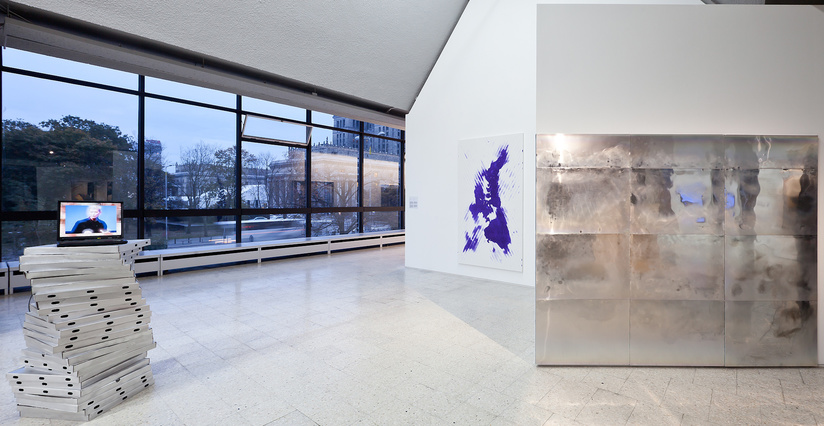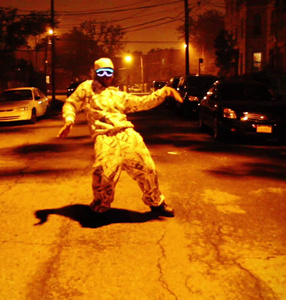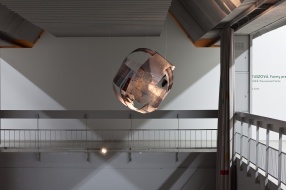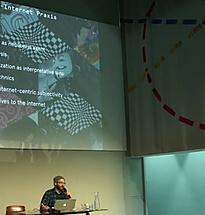Private Settings
Art after the Internet

How does the rampant technological progress and our daily contact with media shape the experience of identity and social interaction?
The exhibition attempts to answer this question from the perspective of the generation of artists born in the 1980s and 1990s, who entered the artistic scene amid the dynamic expansion of the Internet and mass digital culture, in a space full of seemingly limitless possibilities and characterised by an excess of images and information.
For the young generation, the web is not a space beyond material reality, but rather an integral element of the everyday, which encourages increasingly bold design of one’s own identity and its management. While the Internet and mass access to new technologies have reshaped the intimacy of one-to-one feedback, they also provoke expressive individualism and „curating” aspirations of our virtual existence. What matters is affect and presence. And yet, the architecture of the web, in which we vehemently like, hate, recommend, blog, and create ratings, does not favour getting to know the Other, but limits us to a compulsive urge of self-documentation and an optimistic affirmation of the „friends of our friends”.
It is also a landscape of ever-blurring borders between production and consumption, the public and private domains, original and copy, the intimate and the transparent. The irresistible need to express oneself, one’s opinions, and the “authenticity” of the message have had an irrevocable impact on our experience of ties and relations with another human being. Everything is changing: the record and distribution of our own selves, the manner of representation and the potential of identification. The unprecedented freedom of communication and expression generate the possibility of daily performance of gender, race, social roles and hierarchies.
The exhibition is an answer to this striking metamorphosis of the social consciousness, highlighting it as an element which has fundamentally revalued the question of freedom, privacy and anonymity of each and everyone of us. Young artists engage actively in these changes and shape a new language and aesthetic categories. They ask questions about the condition of the individual and the essence of visual representation: the way we perceive and express ourselves through images in the era of aggressive self-promotion and economy of attention. In a way, it can be seen a reaction to today’s imperative of creative participation in public life, symbolised by the figure of a prosumer – at once a spectator and an amateur creator of culture. Along these lines, the logic of late capitalism favours not only solid hardware but, more importantly, inventive software with its promise of personal fullfilment and successful conveying of one's own personality and brand.
“Private Settings“ is also an attempt to shed a new light on the language of contemporary visual culture – from idealised stock photographs and homogenous corporate conventions, to the chill of the digital abyss and the aesthetics of amateur Internet practice, which questions the cult of the professional artist and traditional ways in which art functions in the society.
The exhibition is accompanied by an abundant programme of collateral events – from film screenings and meetings with artists, to performances by Korakrit Arunonandchai, Jesse Darling and DIS and the Internet projects by Czosnek Studio group and the artist Yuri Pattison.
Sarah Abu Abdallah and Joey L. DeFrancesco, Korakrit Arunanondchai, Ed Atkins, Trisha Baga and Jessie Stead, Darja Bajagic, Nicolas Ceccaldi, Jennifer Chan, CUSS Group, Czosnek Studio, Jesse Darling, DIS, Harm van den Dorpel, Loretta Fahrenholz, Daniel Keller, Ada Karczmarczyk, Jason Loebs, Piotr Łakomy, Metahaven, Takeshi Murata, Yuri Pattison, Hannah Perry, Jon Rafman, Bunny Rogers, Pamela Rosenkranz, Gregor Różański, Ryan Trecartin, Ned Vena
Exhibition production
Natalia Sielewicz
Assistant of production
Joanna Adamiak
Exhibition design
Projekt Praga
Visual identification
Emilia Obrzut
Installation and technicians
Michał Ziętek
Piotr Fryszak
Szymon Ignatowicz
Paweł Sobczyk
Marcin Szubiak
Jakub Antosz
Marek Franczak
Zbigniew Kolasa
Paweł Nowożycki
Michał Dominik
Jan Spytkowski
Rafał Król


